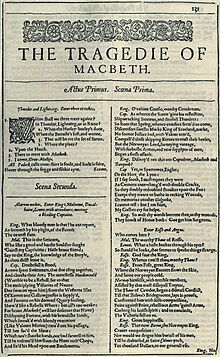
Back Macbeth Afrikaans مكبث (مسرحية) Arabic Macbeth AST Макбет Bulgarian ম্যাকবেথ Bengali/Bangla Macbeth Breton Macbeth BS Macbeth Catalan Macbeth Czech Macbeth (drama) Welsh
 Title page of the part in the First Folio. | |
| Author | William Shakespeare |
|---|---|
| Language | English |
| Genre | Shakespearean tragedy Tragedy |
| Set in | Scotland and England (Act IV, Scene III) |
| Publisher | Edward Blount and William Jaggard |
Publication date | 1623 |
| Publication place | London, England |
| Text | The Tragedie of Macbeth at Wikisource |

The Tragedy of Macbeth, often shortened to Macbeth (/məkˈbɛθ/), is a tragedy by William Shakespeare. It is estimated to have been first performed in 1606.[a] It dramatises the physically violent and damaging psychological effects of political ambitions to power. It was first published in the Folio of 1623, possibly from a prompt book, and is Shakespeare's shortest tragedy.[1] Scholars believe Macbeth, of all the plays that Shakespeare wrote during the reign of King James I, contains the most allusions to James, patron of Shakespeare's acting company.[2]
In the play, a brave Scottish general named Macbeth receives a prophecy from a trio of witches that one day he will become King of Scotland. Consumed by ambition and spurred to violence by his wife, Macbeth murders the king and takes the Scottish throne for himself. Then, racked with guilt and paranoia, he commits more violent murders to protect himself from enmity and suspicion, soon becoming a tyrannical ruler. The bloodbath swiftly ends badly for both Macbeth and Lady Macbeth who driven by overwhelming guilt and regret turns to madness and death, Macbeth soon follows.
Shakespeare's source for the story is the account of Macbeth, King of Scotland, Macduff, and Duncan in Holinshed's Chronicles (1587), a history of England, Scotland, and Ireland familiar to Shakespeare and his contemporaries, although the events in the play differ extensively from the history of the real Macbeth. The events of the tragedy have been associated with the execution of Henry Garnet for complicity in the Gunpowder Plot of 1605.[3]
In the backstage world of theatre, some believe that the play is cursed and will not mention its title aloud, referring to it instead as "The Scottish Play". The play has attracted some of the most renowned actors to the roles of Macbeth and Lady Macbeth and has been adapted to film, television, opera, novels, comics, and other media.
Cite error: There are <ref group=lower-alpha> tags or {{efn}} templates on this page, but the references will not show without a {{reflist|group=lower-alpha}} template or {{notelist}} template (see the help page).
- ^ Clark & Mason 2015, p. 1.
- ^ Wickham 1969, p. 231.
- ^ Bloom 2008, p. 41.